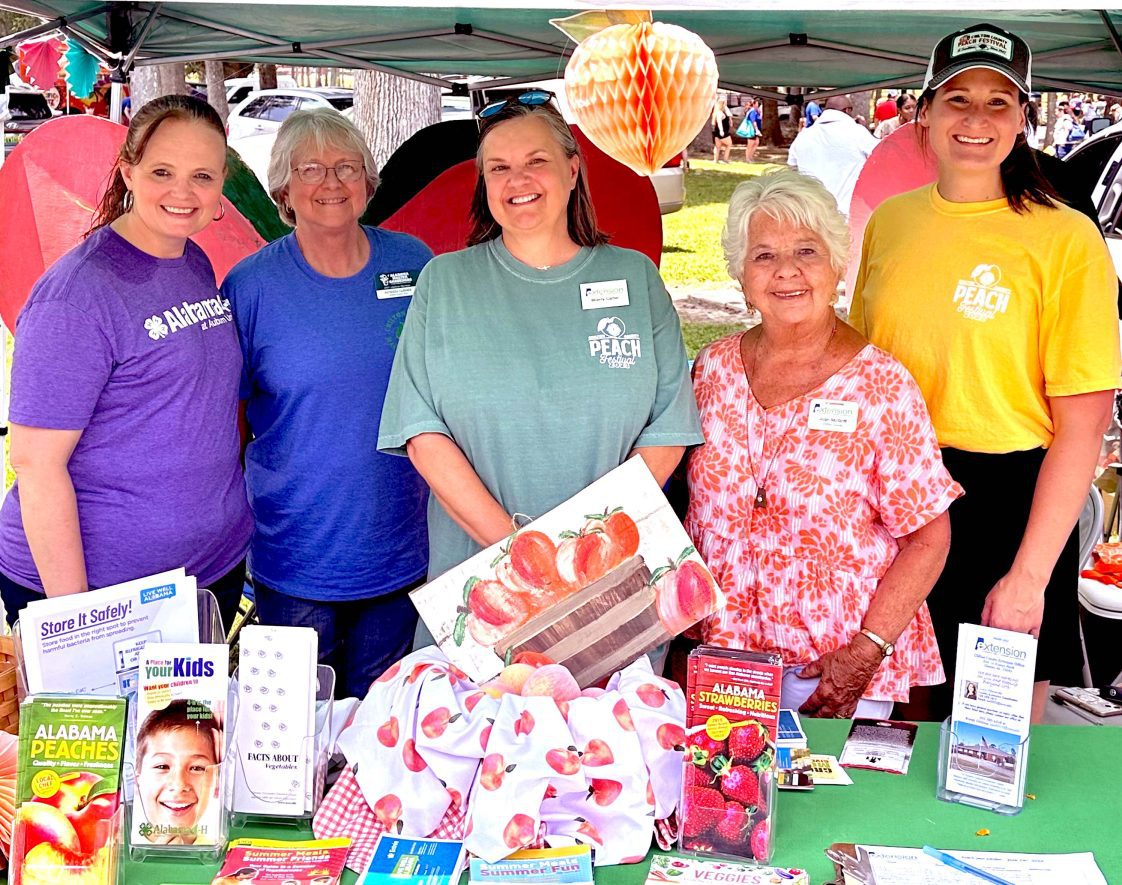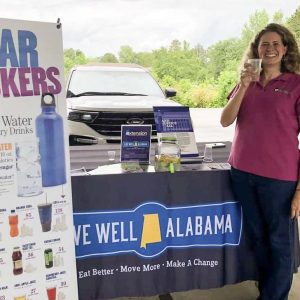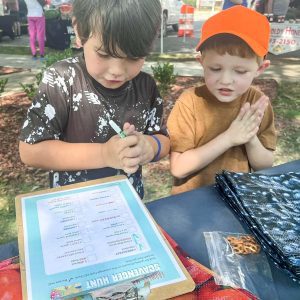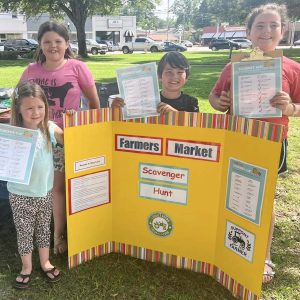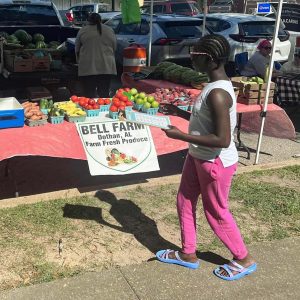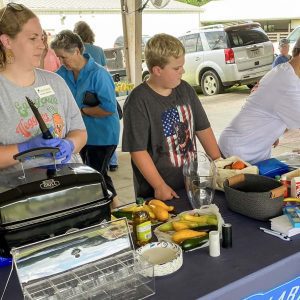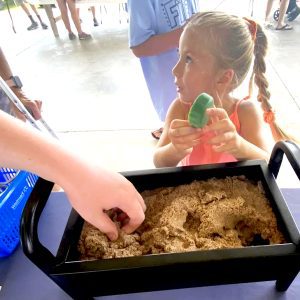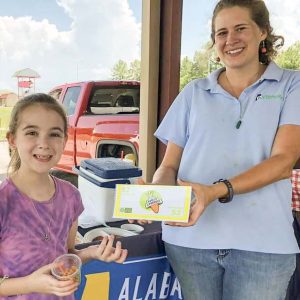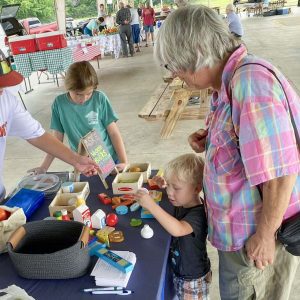Home & Family

AUBURN UNIVERSITY, Ala. — The Alabama Cooperative Extension System is taking a creative spin on nutrition education. At farmers markets across Alabama, agent assistants with the Supplemental Nutrition Assistance Program-Education (SNAP-Ed) are drawing crowds with food demonstrations and educational opportunities.
Each week, SNAP-Ed educators in several counties interact with adults and children at their local farmers markets. They provide nutritious recipes as well as tips for incorporating healthy meals into a busy lifestyle. In some cases, they also give vouchers to children to purchase fruits and vegetables.
“Farmers markets can be a vibrant hub for communities,” said Sondra Parmer, assistant director of federal nutrition programs at Alabama Extension. “SNAP-Ed educators collaborate with local partners to make fruits and vegetables more appealing and affordable for SNAP recipients. Our ultimate goal is to increase access to and consumption of healthy foods—and that includes locally grown produce.”
Empowering Children
Through SNAP-Ed’s Veggie Bucks program or the Power of Produce (POP) program, children engage with a SNAP-Ed educator to learn about fruits and vegetables. In many cases, students receive a voucher that can be used to purchase food at the market.
Veggie Bucks
Kristen Sanders, a SNAP-Ed educator in Crenshaw and Pike counties, spends each week hosting a fun activity for children about fruits and vegetables. For example, Sanders sets up a planter box filled with toy vegetables buried in kinetic sand. Children reached into the sand to dig up a vegetable, pretending they were harvesting it from garden soil. As they pull up each vegetable, Sanders asks if they know what it is or if they ever tried it. With older children, she asks if they know what nutrients it contains and how good it is for their health.
When the children come to the table, so do their parents. Sanders takes the time to engage parents and adults with Live Well Alabama recipe cards and food demonstrations. She also has tip sheets and tools to help parents in the kitchen.
“I wanted to make sure I did something different each week so people would keep coming back to our table,” Sanders said. “We want to keep it fun and educational. We also want something where kids and parents look forward to stopping by the Alabama Extension table every week.”
When the children finish the activity and taste a vegetable, Sanders rewards them with a $2 Veggie Bucks voucher. With this voucher, they can purchase fruits and vegetables at the market. Sanders was inspired to bring vouchers to her local market because of a similar program initiated by Cindy Harper, the St. Clair County SNAP-Ed educator, at the Pell City Farmers Market in 2022.
POP
The idea of fruit and vegetable vouchers isn’t new to SNAP-Ed. Since 2018, Jennifer Palmer—the SNAP-Ed educator in Lawrence and Colbert counties—has been involved with the POP program through the Farmers Market Coalition. In her efforts, Palmer has gotten guidance from Lawrence County Extension Coordinator Donna Shanklin.
Palmer’s setup is similar to Sanders’ activities. At the market, children stop at the Extension table for an interactive activity, usually one based on physical activity. For example, children may have the chance to play bean bag toss, Hula-Hoop or jump rope when they visit her table. Also, Palmer has a vegetable tasting, typically involving a vegetable featured in the Live Well Alabama recipe card she’s handing out that week. If the children participate in the activity and try the food, they get a $2 voucher to spend at the market.
“It’s so much fun watching the kids enjoy themselves while learning about fruits and vegetables,” Palmer said. “When we give them the voucher, you can see the sense of ownership they have over what they buy. We also know that if they buy fruit and vegetables themselves, they are much more likely to eat it.”
Getting Creative
Elizabeth Kohen, a SNAP-Ed educator in Barbour County, is also making a push to make farmers markets more than just a destination for adults. When parents bring their children by the Extension tent at the Headland Farmers Market, they might be sent on an adventure and go home with a prize. Kohen sets up a scavenger hunt where children look for fruits and vegetables they’ve never eaten, a breakfast ingredient or a vegetable that grows in the ground. From there, they go from vendor to vendor, engaging with the farmers and learning about produce. If they complete the hunt, they go home with a prize that motivates them to eat more fruits and vegetables or engage in more physical activity.
“Farmers markets are not just for adults to shop,” Kohen said. “Even kids can pick out their own produce and enjoy shopping local while having fun with an activity from the Live Well Alabama table.”
Serving Seniors
Sherry Carter, a SNAP-Ed educator in Bibb and Chilton counties, serves a different audience at the Bibb County Medical Center Farmers Market. She said there aren’t many children but there is a big senior citizen population. Many shoppers at the market utilize the Alabama Senior Farmers Market Nutrition Program. This is a federal program that provides eligible seniors with a $50 voucher to purchase fresh fruits and vegetables from farmers markets.
Carter said she takes the opportunity to engage residents in tasting new recipes and discussing nutrition and health. While they are at her table, she gives them a recipe card that features something in season at the market.
“The goal is to help people eat nutritiously and buy fruits and vegetables from a local farmer,” Carter said. “If we don’t support our local farmers, then they won’t come to the market. That will eliminate another avenue for residents to have access to fresh produce.”
More Information
For more information about SNAP-Ed, visit www.LiveWellAlabama.com or visit Live Well Alabama on Facebook, Twitter and Instagram.

